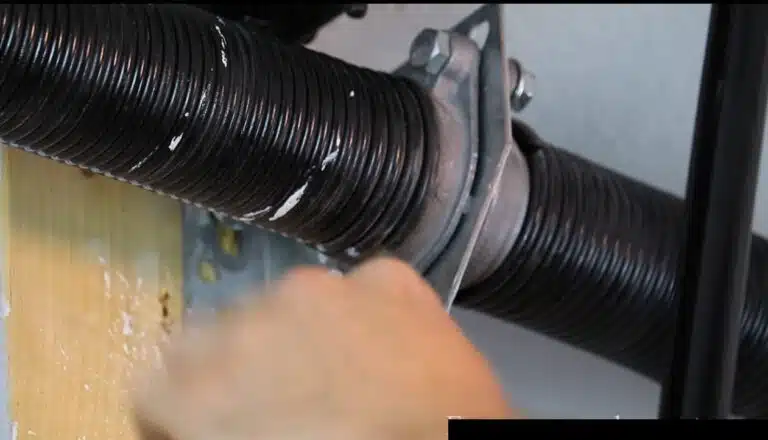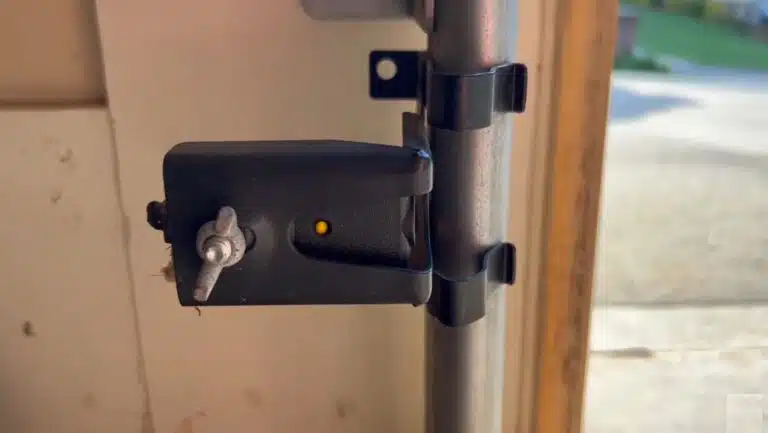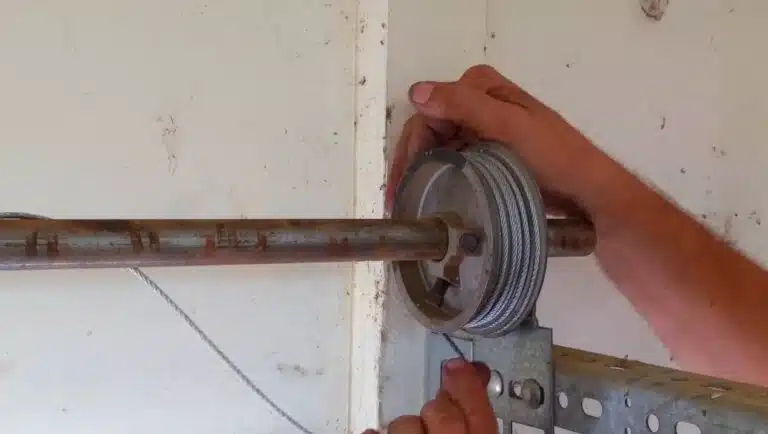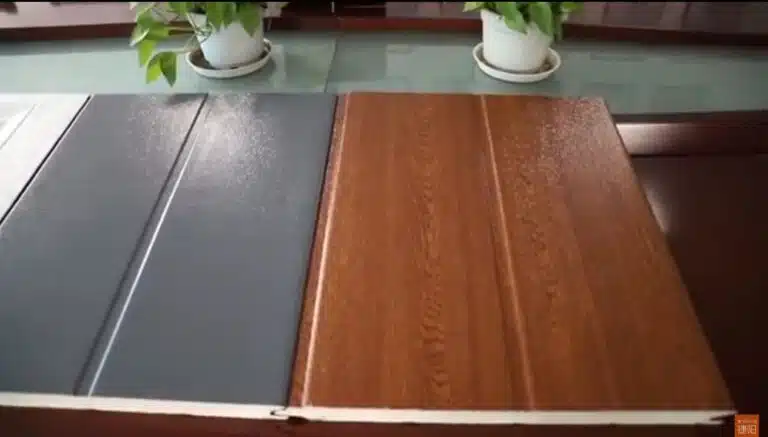Maintaining your garage door requires the right lubricant to ensure smooth operation and extend its lifespan. But how do you choose between a silicone-based spray and white lithium grease for your springs? Each option offers specific benefits depending on the needs of this crucial component. Once your springs are properly maintained, it’s just as important to care for other parts like rollers, hinges, and tracks. In this article, we’ll guide you step by step to select the best lubricant for each part, with recommended products for optimal maintenance.
When to use silicone spray for springs?
Silicone spray is ideal for garage door springs that support light to moderate loads, typically up to 50 to 100 kg (110 to 220 pounds). This type of lubricant is especially suitable if your garage is located in a humid environment. It forms a protective water-resistant layer, preventing rust from setting in on your springs. If your garage door squeaks, the spray also offers a quick solution to reduce unpleasant noise while preventing dust build-up.
In addition, this lubricant is perfect for simple and regular maintenance. An application every six months is enough to keep the springs in excellent condition. It is particularly suitable for standard residential doors, often made of aluminum or light steel, lightweight up-and-over doors, and modern sectional doors with insulated panels or composite materials. Finally, it is ideal for small garage doors, such as those designed for motorcycles or small cars.
When to choose white lithium grease for springs?
White lithium grease is a good choice for garage door springs that support heavy loads, exceeding 100 kg (220 lbs). This lubricant is particularly recommended for industrial or very heavy doors, often made of solid steel or equipped with thick insulated panels. It provides long-lasting lubrication, withstanding extreme conditions such as very hot or cold temperatures, as well as dusty environments.
This type of grease is also ideal if you want to reduce the frequency of maintenance. A single application guarantees long-term protection, even under significant stress. Lithium grease is ideal for heavy industrial or commercial doors, solid wood doors, often old and imposing, as well as insulated sectional doors designed for double garages. Finally, it is essential for steel or solid wood up-and-over doors, which require robust lubrication to operate smoothly.
The Best Lubricant for Your Springs
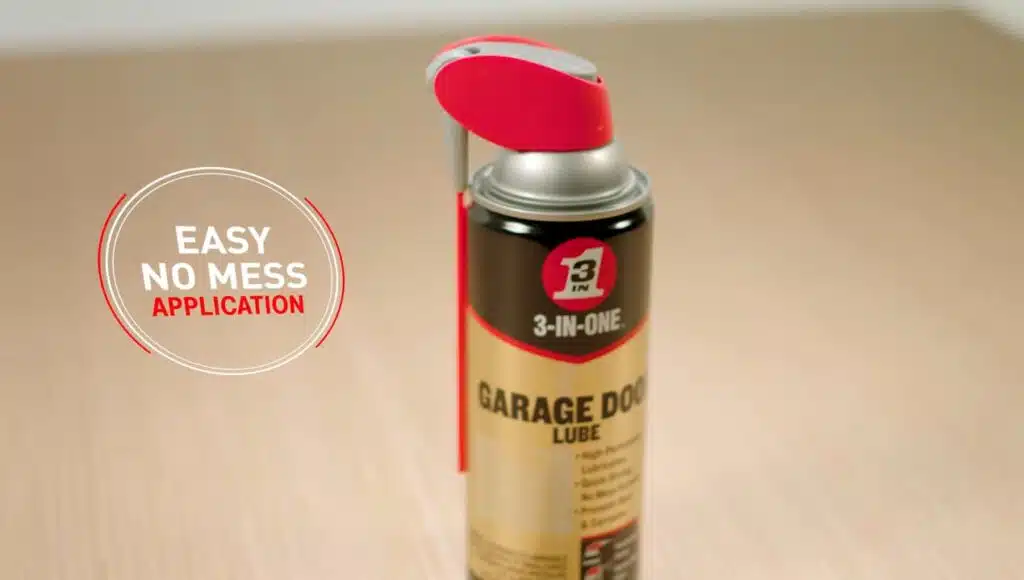
Are you looking for a simple and effective solution to maintain your garage door springs? Let me tell you about 3-IN-ONE Garage Door Lubricant, a product designed specifically for the needs of garage doors. It protects your springs, reduces squeaks and ensures their optimal operation, while being one of the most popular lubricants on the market.
Why choose 3-IN-ONE Garage Door Lubricant?
First, it offers superior protection against rust and corrosion. This lubricant forms a thin protective layer that prevents moisture and dirt from seeping into your springs, extending their lifespan. This is an essential asset if your garage is exposed to humidity or frequent climate variations.
Then, it effectively reduces noise and friction. If your door squeaks or its movements seem jerky, this product ensures smooth and quiet operation from the moment it is applied.
What I particularly like is that its formula is clean and non-greasy. No sticky residue: your springs stay clean, without any build-up of dust or debris. This means easier and less frequent maintenance.
Easy to use, even for beginners
With its specially designed spray tip, 3-IN-ONE Garage Door Lubricant allows for precise and uniform application, even in hard-to-reach areas such as spring coils. No need to be an expert: just a spray, a few movements of the door, and it’s done!
A Versatile Product for All Components
3-IN-ONE Garage Door Lubricant isn’t just for springs. It’s a versatile lubricant that works great on other components of your garage door:
Hinges
Hinges, often responsible for squeaking noises, benefit fully from this lubricant. A light application immediately eliminates unpleasant noises and ensures smooth and silent movement.
2. Rollers
The rollers, subjected to constant friction, are perfectly lubricated with this product. It reduces friction, prevents premature wear, and ensures smooth opening and closing, even for the heaviest doors.
3. Tracks
For tracks that squeak or slow door movement, this lubricant easily penetrates hard-to-reach areas, providing consistent, long-lasting lubrication. It also protects against rust, even in humid environments.
4. Joints and Motorized Mechanisms
Dried-out joints regain their flexibility with a small amount of this product, while chains and gears in motorized mechanisms benefit from lubrication that extends their life and reduces corrosion.
An Economical and Durable Product
3-IN-ONE Garage Door Lubricant is designed to last. A small amount is all you need for each application, making the bottle very economical. Plus, its long-lasting formula reduces the frequency of maintenance, saving you time while ensuring the protection of your components.
Why is it the Best Choice?
With 3-IN-ONE Garage Door Lubricant, every component of your garage door is carefully protected and maintained. From springs to hinges, rollers, tracks and seals, this lubricant ensures smooth operation and increased longevity. Designed specifically for garage doors, it is a must-have choice to avoid costly repairs and ensure effortless maintenance. Try it and you will understand why so many garage door owners prefer it!
Recommended Garage Door Lubricants: A Comparative Table
| Product | Type | Key Features | Best For | Price Range |
|---|---|---|---|---|
| WD-40 Specialist Silicone Spray | Silicone-Based | Water-resistant, dust-repellent, fast-drying | Regular maintenance, rust prevention | $7.99 – $9.99 |
| Blaster Garage Door Lubricant | Silicone-Based | Weather-resistant, prevents rust and corrosion | Outdoor use, frequent operation | $6.99 – $8.99 |
| 3-IN-ONE Garage Door Lubricant | Multi-Purpose | Quick-drying, precise straw for easy application | Hard-to-reach areas, general lubrication | $8.99 – $10.99 |
| WD-40 White Lithium Grease | Lithium-Based | Heavy-duty, long-lasting protection, excellent rust protection | High-load components like springs | $5.99 – $7.99 |
| Liquid Wrench Garage Door Lube | Lithium-Based | Durable, low-odor formula, quiets noisy springs | High-tension springs, rust prevention | $5.99 – $8.99 |
Proper Lubrication Steps:
- Gather materials: You will want a premium garage door lubricant
- Disconnect the door opener: Always disconnect the automatic opener prior properly greasing the springs for safety.
- Clean the springs: Before adding the oil to guarantee seamless functioning, clean the springs by wiping off any dirt or dust.
- Apply lubricant: Holding the spray roughly six inches from the springs, evenly coat the coils with lubricant.
- Test the door: After lubrication application, manually open and close the garage door to equally disperse the lubricant.


